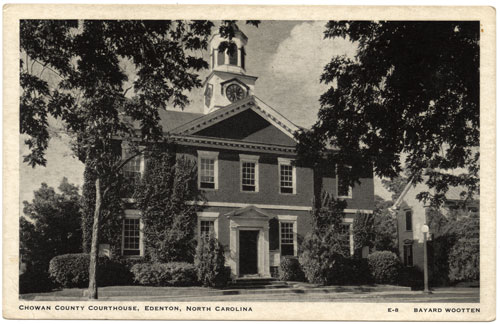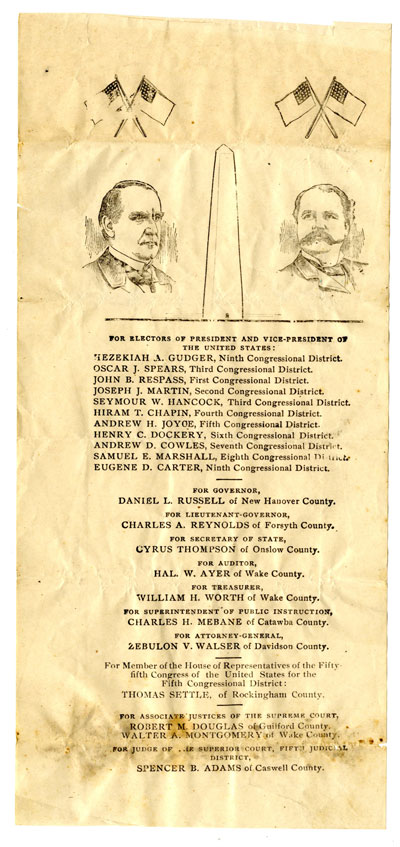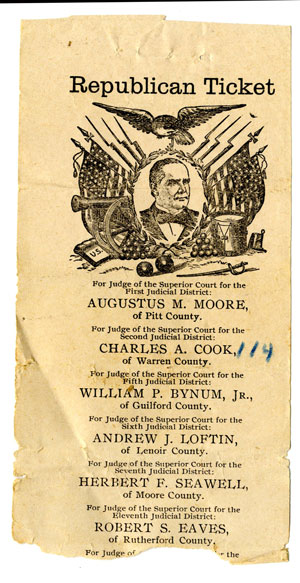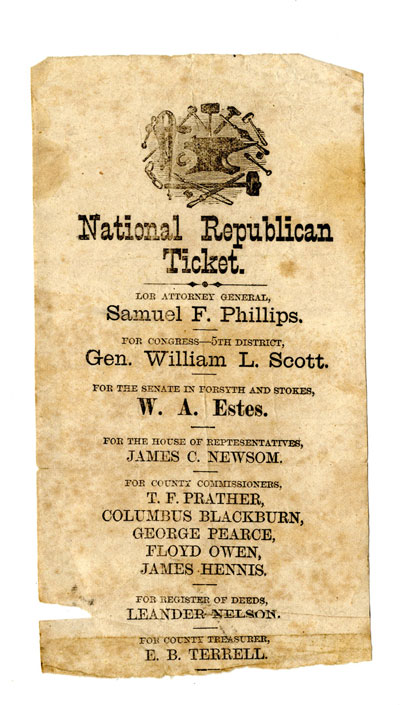Flipping through some issues of the Roanoke Beacon (Plymouth, N.C.) from 1898, I found their endorsements for the coming election, which were given entirely in verse. I don’t recall see anything like this in other papers. What a shame that it didn’t catch on.
![]()
From the Roanoke Beacon issue published November 4, 1898.
Month: November 2012
Blackout babies? UNC sociologist investigated
“ ‘It is evidently pleasing to many people,’ said Richard Udry, a sociologist at the University of North Carolina who studied post-blackout birth rates, ‘to fantasize that when people are trapped by some immobilizing event which deprives them of their usual activities, most will turn to copulation.’
“Udry’s [1970] study found that the blackout babies of 1966 were…. ”
— From “Will there be a Hurricane Sandy baby boom?” by Matt Soniak at Mental Floss (Nov. 8)
Dr. Udry, whose career covered much more than blackout babies, died July 29 in Chapel Hill at age 83.
Heels’ big loss was big win for Vin Scully
Sports announcer Vin Scully traces his career break to a painful loss suffered by UNC’s football team.
It was 1949, and CBS radio had just agreed to give the 21-year-old Scully a tryout, calling in updates for Red Barber’s Saturday afternoon football roundup. Barber dispatched him to cover Maryland vs. Boston University at Fenway Park. Despite the unexpectedly primitive conditions — without coat or gloves he had to stand on the roof in the cold wind with a hand mike and a long cord — Scully remembers the day fondly:
“I got lucky. The big game that day was supposed to be Notre Dame-North Carolina, but that turned into a rout (42-6), and my game was a thriller, so I was called in more often for reports.”
Barber was impressed with the novice’s performance, and by the next baseball season Scully had joined him in broadcasting Dodgers games — which he still does today, 62 years later.
For Hotel Charlotte, a final moment of boom times
On this day in 1988: Taping a TV special, magician David Copperfield, handcuffed and locked in a safe, escapes from the old Hotel Charlotte moments before its implosion.
The 12-story hotel has been closed since 1973, but in its heyday it was Charlotte’s finest. Among its guests: Presidents Franklin Roosevelt, Dwight Eisenhower, Lyndon Johnson and Richard Nixon; Elvis Presley; Huey Long; Jack Dempsey and Babe Ruth. Bill Monroe and Roy Acuff recorded in its 10th-floor studios, and Tommy Dorsey, Guy Lombardo and Kay Kyser performed in its ballroom.
Edenton Celebrates 300 Years

Edenton kicks off its anniversary celebrations today at noon with the ringing of the Chowan County Courthouse bells 300 times. The town dates its beginning to the passage of an act in the colonial Assembly calling for “building a Court house to hold the Assembly in, at the fork of Queen Ann’s Creek commonly called Matchacamak Creek in Chowan precinct.” The settlement around that courthouse became known as Edenton in 1722, when the Assembly named it in honor of Charles Eden, the colony’s royal governor, who had died earlier that year.
19th-century election tickets from North Carolina

While paper ballots haven’t gone the way of the Edsel, you’d be hard pressed to find ones like those used in North Carolina’s elections in the 19th century. As Douglas W. Jones, co-author of Broken Ballots: Will Your Vote Count notes in his “Brief Illustrated History of Voting”, the first paper ballots were slips provided by the voter himself. But little time passed before political parties provided voters with a pre-printed ticket listing their slate of candidates.
The pre-printed ballots provided the political parties with several controls over voting. As noted in a previous post, the parties sometimes printed their tickets on colored sheets of paper. Because voting often took place in the open, party loyalists, who traded cash for votes on election day, could watch to ensure that the voter they had just bribed upheld his end of the bargain by voting for the right slate. In time, supporters of clean elections pushed through regulations requiring all tickets be printed on white paper. But the new requirements did not curb the parties’ previous practices. They simply printed their tickets on paper with slightly different shades of white. The political parties also realized that through their choice of typography and spacing on their tickets they could reduce the likelihood of voters veering from the party slate and writing in a different choice.
Increasing concerns about election abuses in the 1870s and 1880s led reformers to push for private voting and the creation of an official, non-partisan ballot, commonly known as the Australian ballot because legislators in Australia had led the way by adopting a secret, official ballot in the 1850s. In the United States, Kentucky was the first state to adopt the Australian ballot, employing it in Louisville municipal elections in February 1888. Massachusetts followed three months later, requiring its use statewide. In the ensuing years, other states also required official ballots, in some cases only for local elections and, in others, for statewide races.
In North Carolina the first use of the Australian ballot was in New Hanover County. State legislators passed legislation requiring its use there in 1909. Twenty years passed before lawmakers mandated official ballots for elections throughout the state. In 1928 O. Max Gardner, a Democrat from Shelby, campaigned for governor on a pledge to implement the Australian ballot statewide. In his inaugural address on January 11, 1929, Gardner told citizens that he believed elections in North Carolina were “fair, honest, and just,” but “conditions may still be improved by the passage of a fair and just secret ballot law.” The first issue addressed by the General Assembly in 1929 was the secret ballot. Although some senators opposed the legislation for fear that it could reduce the strength of the Democratic party, the bill passed in the Senate 41 to 9. The margin was wider in the House, where lawmakers approved the secret ballot 92 to 14.
The party tickets above and below predate the Australian ballot. The 1896 Republican ticket (above) features line art of William McKinley (left) and his running mate, Garret Hobart. Of course, McKinley and Hobart prevailed in the election as did Daniel L. Russell, who became the first Republican elected governor of North Carolina since the end of Reconstruction in 1877. In the Presidential portion of the ticket note the listing of electors, a reminder that the electoral college actually determines the occupant of the White House.
The 1898 Republican judicial ticket (below) is a reminder that judicial elections were partisan until the 1990s. In 1996 the General Assembly established non-partisan elections for Superior Court judges, effective in 1998. In 2001 legislators passed a bill requiring non-partisan elections for District Court judges. And in 2002, lawmakers enacted legislation making elections for the state Court of Appeals and Supreme Court non-partisan.

It’s unclear whether the tickets pictured here were actual ballots or simply a list of candidates provided by the Republican Party. They are among items in the Walter Winbourne King Papers in our sister collection, the Southern Historical Collection. King (1846-1913) was a Stokes County attorney and politician. He was elected to the state House in 1876 and served there until he resigned in 1878 to become solicitor, known today as a district attorney, for the area serving Stokes County.

God and Goldwater in Kinston, North Carolina
“The first trip I took with [1964 Republican presidential candidate Barry Goldwater] was to North Carolina, where he spoke in a roller-skating rink converted for the evening to a banquet hall. The occasion was a dinner in honor of the outstanding young men of Kinston.
“He told his audience that the United States could never coexist with communism because Communists did not believe in God.
” ‘It’s as simple as that,’ he said.
“What was striking about such utterances was the conversational, mild way in which he said them. He never tried to excite an audience or carry it along with him. You had the feeling that if someone stood up and yelled, ‘You’re nuts,’ Goldwater would only smile and shrug.”
— From “Requiem for a Lightweight” by Charles Mohr (Esquire magazine, 1965)
1898: Roadblock on Philip Gerard’s tenure track
“When Philip Gerard was writing Cape Fear Rising as an untenured professor in the early ‘90s, he was called in for a meeting with the Chancellor of UNC Wilmington.
“ ‘I walk in and it’s not just the Chancellor,’ Gerard said, ‘it’s every Vice Chancellor and Dean sitting around this conference table. And the Chancellor says, “Now Philip, can you tell them what your book is going to be about?” ‘
“Gerard said he was unaware that many of the descendants of the 1898 conspirators were influential members of the university. ‘I didn’t realize at that point that Mrs. Hugh McRae was the chair of the board of trustees, George Rountree [III] was on the board of trustees, and a number of other families mentioned in the book had close ties in one way or another to the university.’
“Gerard was quick to note that he was not threatened during the meeting, but he was later told that, after he left the room, ‘that there was a spirited discussion and a motion among the board of trustees to not grant me tenure.’ ”
–– From “Revising the Revisionists” by Johannes Lichtman in the Rumpus (July 10, 2012)
